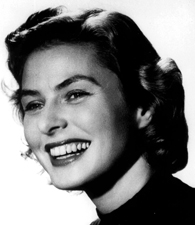“I work so hard before the camera and on the stage that I have neither the desire nor the energy to act in my private life,” actress Ingrid Bergman once said in a New York Times interview. Renowned for her striking, unadorned beauty as well as her phenomenal talent as an actress, Bergman was quite a departure from the standard Hollywood starlet.
Ingrid Bergman’s Early Days
Ingrid Bergman was born in Stockholm, Sweden, on August 29, 1915. Her mother died when she was a toddler. Bergman’s father owned a photography shop and used a motion picture camera to film his little daughter. He died when Bergman was 12; she was then cared for by an aunt, who also died soon after, and the young girl was passed on to an uncle.
In a 1943 New York Times interview, she said that her relatives discouraged her from being an actress, but she persisted. She appeared in high school plays and as an extra in a film. She was able to pursue her own path after graduation, and used her inheritance to pay tuition at Royal Dramatic Theater School in Stockholm.
Bergman left the school a year later, after she was cast in a small role in a Swedish film. In 1936, she starred in “Intermezzo,” the film that sealed her position as a star in Sweden and also launched her Hollywood career. American producer David O. Selznick remade the Swedish hit in 1939, which starred Bergman alongside Leslie Howard.
Sources in this Story
- The Official Ingrid Bergman Web Site: Biography
- The New York Times: Ingrid Bergman: In, but Not of, Hollywood
- Chicago Sun-Times: Casablanca (1942)
- All Movie Guide: Ingrid Bergman
- Filmsite.org: The Best Supporting Actress Academy Awards
- The New York Times: Ingrid Bergman, Winner of 3 Oscars Is Dead
Bergman’s Acting Career
After her arrival in Hollywood, Bergman worked alongside the town’s A-list names, such as Humphrey Bogart, Cary Grant, Bing Crosby and director Alfred Hitchcock. Her many admirers counted Bergman’s natural beauty and unassuming disposition among her best qualities.
She became a true Hollywood star following her appearance in 1942’s “Casablanca” opposite Humphrey Bogart. She was acclaimed for her performance and her chemistry with Bogart, though she did not think she was worthy of such praise: “I cared for myself less in that part than in the serious roles I have played,” she told the Times.
Her emotionally authentic performance was aided by the fact that she didn’t know whether her character would board a plane or stay in Casablanca with Bogart in the film’s famous final scene. “Bergman played the whole movie without knowing how it would end,” writes film critic Roger Ebert, “and this had the subtle effect of making all of her scenes more emotionally convincing; she could not tilt in the direction she knew the wind was blowing.”
Bergman felt out of place in Hollywood and didn’t act like a typical star. She was known to have once waited in line for one of her own films without being recognized. “Unpainted fingernails, skin that doesn’t look like icing on a cake, a natural manner, unpretentious clothes—these usual things make her unusual among Hollywood stars,” wrote the Times.
Bergman fell from grace, at least in the eyes of American audiences, during the 1950 filming of “Stromboli.” She had an affair with the movie’s director, Roberto Rossellini, and became pregnant by him while still married to her previous husband, Dr. Petter Lindström. The public made its opinion clear; the film was banned in some places and was ultimately a flop at the box office. She continued to make films in Europe, and eventually returned in triumph in 1956 to Hollywood to star in “Anastasia.”
Berman collected a host of awards during her career, including two Best Actress Oscars for 1944’s “Gaslight” and 1956’s “Anastasia. In 1974, her role in “Murder on the Orient Express” made her the first actress to win a Best Supporting Actress Academy Award after already winning two Best Actress Oscars.
The Woman and Her Work
The Rest of The Story
Bergman was diagnosed with breast cancer in the mid-1970s, but she continued working. Her final film, Ingmar Bergman’s “Autumn Sonata” (1978), earned her an Academy Award nomination, while her final role, as Israeli Prime Minister Golda Meir in the 1982 TV miniseries “A Woman Called Golda” netted her an Emmy and a Golden Globe.
Ingrid Bergman died on August 29, 1982, her 67th birthday, after an eight-year battle with cancer.
This article was originally written by Rachel Balik; it was updated August 27, 2017.











